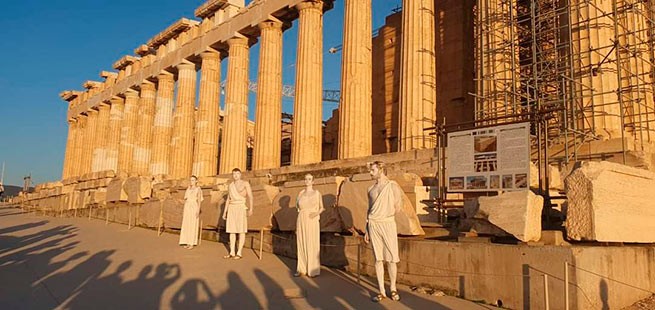The ancient Asklepion in Trikala, Thessaly, one of the most important healing temples of the ancient world, will be restored, the Ministry of Culture announced on Wednesday.
The Temple of Asklepion, that is, dedicated to the god Asclepius, in ancient times was a place where people from all over Greece came for medical procedures.
Asclepius (ancient Greek Ἀσκληπιός), or Aesculapius (lat. Aesculapius), is the god of medicine in ancient Greek and Roman mythologies. According to the classical version of the myth, Coronida, pregnant with Asclepius, cheated on Apollo with the mortal Ischius, for which she was killed. On the funeral pyre, Apollo took Asclepius out of the womb of Coronida and handed him over to be raised by the centaur Chiron, who taught the boy the art of healing, in which he achieved unprecedented success.
Asclepius learned not only to treat a wide variety of diseases, but also to resurrect the dead. According to one version of the myth, he did this not out of good intentions, but for a fee. Such actions angered the Olympian gods, who considered them a violation of the laws of the world order. Zeus struck Asclepius with lightning, but then revived and deified.
The cult of Asclepius became very popular in Ancient Hellas and forced out other “divine doctors”. The temples of the god Asklepion became a kind of hospital, where the afflicted flocked. The priests of the god of Asclepias descended from Asclepius. Initially, their help consisted in performing magical rituals; over time, they learned to use other methods of treatment, including hydrotherapy, diets, gymnastic exercises, the use of various herbs, and even surgical interventions. For several centuries, the Asklepiads have been able to accumulate knowledge on the effective treatment of a number of diseases. Asclepiad of Kos Hippocrates was one of the first to argue that diseases arise due to natural causes, rejecting the existing superstitions about the intervention of the gods. It is with his name that the separation of medicine into a separate science is associated.
The Minister of Culture and Sports, Lina Mendoni, said that “in the city of Trikala, in Ancient Trikka, there was one of the oldest and most famous (temples) in the entire ancient world – Asklepion“.
The Asklepion of Trikala, included carefully controlled spaces conducive to healing, and met several requirements for institutions established for healing. Treatment in these temples was mainly aimed at promoting a healthy lifestyle, with special attention paid to the spiritual needs of man.
View the embedded image gallery online at:
https://rua.gr/news/news/55094-v-trikale-vosstanovyat-antichnyj-khram-asklepiya.html#sigProId7a82d792e5
The Greek temple of healing Asklepion was located in the place where, on the territory of the modern city of Trikala, there was the ancient city of Tricky.
Asklepion was located in ancient Trikki, the remains of which were discovered at the end of the 19th century, when the modern city of Trikala was built on the same site.
Ancient Trikki, an important city of the Thessalian tetrarchy of Estiaotida, lies between the Lytaos River – which today crosses the modern city – and the “Kastro” hill, where the ancient citadel was located.
The earliest mention of Tricky is in Homer’s “Ship List”, which states that the city participated in the expedition of the Greeks to Troy in the Trojan War with 30 ships and leaders, including two sons of Asclepius, Machaonas and Podalerios, who were trained by their father in medicine.
The connection of the city with Asclepius is the antiquity of the city, known as “αρχαιότατον και επιφανέστατον” (“ancient and prominent”), according to the geographer of the 1st century. BC. Strabo, gave reason to consider him “ancient and outstanding” – gave Tricky special fame in Greece.
View the embedded image gallery online at:
https://rua.gr/news/news/55094-v-trikale-vosstanovyat-antichnyj-khram-asklepiya.html#sigProIde84db1fa4d
Remains of ancient Trikka in Trikala.
The earliest confirmed excavations of the city date back to the Bronze Age and are located in the area of the current archaeological site of Trikala.
During the excavations, ceramics were found, indicating that the western slopes of the ancient acropolis were inhabited from the Early Bronze Age (3300 BC) before the Mycenaean era.
Three buildings from the early Roman era and one from the Byzantine period were also discovered.
Veneration of Asclepius in the IV-III centuries BC. e. went beyond the European part of Greece and spread throughout the Mediterranean. In ancient Rome, the cult of the Greek god of medicine was officially recognized in the III century BC. e. Greek name Asclepius romanized into Aesculapius, or Aesculapia.







More Stories
Making a mockery of the Acropolis for the sake of tourism
How Plato spent his last night – what the found papyri showed
Eurovision 2024: the first rehearsal of Marina Satti in Malmö has ended